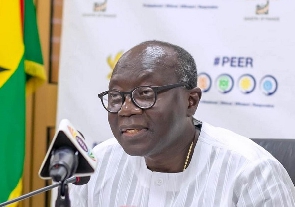An economist, Gideon Amissah, stated that due to the devastating effects of the COVID-19 pandemic, Ghana could not stop borrowing. Ghana's public debt stood at ¢236bilion by the end of March 2020. The economist said: "I may have to say that within the contest we are looking at this, that's COVID-19, it will be difficult for us not to borrow." He noted, "Currently, we are doing 51% external debt as against 49% internal debt, and sometimes it has to do with the currency we borrow." Read the full story originally published on October 29, 2020 by starrfm Managers of Ghana's economy cannot run away from borrowing due to the economic impact of the COVID-19 pandemic, Economist with the Institute of Chartered Economists Gideon Amissah has indicated. In 2018, the national debt of Ghana amounted to approximately 59.29 percent of the GDP. A figure that currently stands at over 65%. Finance Minister Ken Ofori-Atta on Wednesday requested parliament to approve an amount of ¢27,434,180,520 as expenditure in advance for the first quarter of 2021. The move has seen backlash from the minority who claim the minister did not give detailed expenditure for 2020 coupled with what they called excessive borrowing. But Mr. Amissah contends that due to the pandemic, Ghana cannot do without borrowing even as the country's debt stock hits ¢236bilion. Managers of Ghana's economy cannot run away from borrowing due to the economic impact of the Covid-19 pandemic, Economist with the Institute of Chartered Economists Gideon Amissah has indicated. In 2018, the national debt of Ghana amounted to approximately 59.29 percent of the GDP. A figure that currently stands at over 65%. Finance minister Ken Ofori-Atta on Wednesday requested parliament to approve an amount of ¢27,434,180,520 as expenditure in advance for the first quarter of 2021. The move has seen backlash from the minority who claim the minister did not give detailed expenditure for 2020 coupled with what they called excessive borrowing. But Mr. Amissah contends that due to the pandemic, Ghana cannot do without borrowing even as the country's debt stock hits about ¢236bilion ending March this year. Speaking on the Morning Starr in response to the Finance Minister's speech, Mr. Amissah said: "I may have to say that within the contest we are looking at this, that's COVID-19, it will be difficult for us not to borrow." He noted, "currently, we are doing 51% external debt as against 49% internal debt, and sometimes it has to do with the currency we borrow." He described the situation as "more or less like a rat race because you have to pay the debt you owe and since you don't have money to pay, you have to go and borrow and also finance our deficit." "The call must still be the appropriate way where the money will not land in the few people's pockets but will land in the economy and reflect in the lives of the people," he added. 236 billion ending March this year Speaking on the Morning Starr in response to the Finance Minister's speech, Mr. Amissah said: "I may have to say that within the contest we are looking at this, that's COVID-19, it will be difficult for us not to borrow." He noted, "Currently, we are doing 51% external debt as against 49% internal debt, and sometimes it has to do with the currency we borrow." He described the situation as "more or less like a rat race because you have to pay the debt you owe, and since you don't have money to pay, you have to go and borrow and also finance our deficit." "The call must still be the appropriate way where the money will not land in the few people's pockets but will land in the economy and reflect in the lives of the people," he added.
Business News of Friday, 28 October 2022
Source: www.ghanaweb.com

















